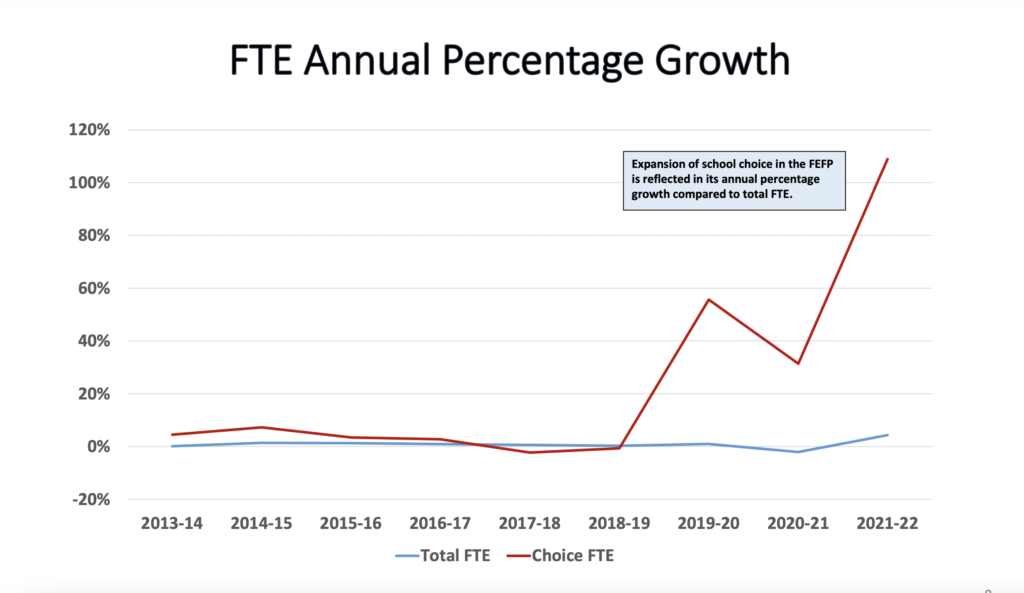Next Week Won’t Be Much Better – Messing With The FEFP
Culture Wars, Academic Freedom in Higher Ed, Universal ESA Vouchers and attacking Teachers Unions – there was a lot going on in Tallahassee last week. Expect more of the same in the upcoming weeks. This week, however, the most destructive bill heard may be one that hasn’t even been filed yet.
This week, keep your eyes out for a Proposed Committee Bill from the House PreK-12 Appropriations subcommittee which may wreak havoc on the Florida Education Finance Program (FEFP), the primary funding source for public schools.
The FEFP was enacted by the 1973 Florida Legislature. It was established:
“To guarantee to each student in the Florida public education system the availability of programs and services appropriate to his educational needs which are substantially equal to those available to any similar student notwithstanding geographic differences and varying local economic factors.”
The formula has been studied extensively, withstood court challenges, and is generally felt to the a national model for equitable funding. You can learn more about the FEFP here and here.
Since their first meeting in January, Chair Josie Tomkow (R-Polk) has been preparing her PreK-12 Appropriations subcommittee to “revamp” the FEFP to better align it with “the state’s educational choice policy.” She referred to rewriting the FEFP as “This is where it gets fun.” You can watch her presentation here (at 2:00).
“While the overall structure and components of the FEFP have not significantly changed in the past 50 years, what has changed is our state’s expansion of school choice. And in particular, non-public school choice funded in the FEFP. For our state to continue to advance the policy of education based on parental choice, the FEFP may need to be revamped to align with this policy. In potentially revamping the FEFP, the categoricals funded in the FEFP may also need to be reviewed.” – Josie Tomkow, 1/4/23
As an example to the growth of non-public school choice in the FEFP, she presented this slide.

The y-axis on this graph is “percentage growth” which is problematic when comparing populations that vary greatly in size. The chart gives the illusion that choice programs, which enrolled just 3.4% of the total FTE in 2021-22, are overwhelming the primary choice of Florida’s families, public schools who educate over 2.9 MILLION students. The Family Empowerment Scholarship (FES), which is funded through the FEFP, was established in 2019 and the following year, prior public school attendance was removed as a requirement for the FES. The growth in 2021-22 reflects the funding of students who never before attended public school and were uncounted in the 1st calculation of the FEFP. In 2021-22, just 98,860 students participated in the FES. Prior to 2019, the only voucher funded via the FES was the McKay scholarship for 25,000 children with disabilities (the McKay program was rolled into the FES in 2021).
At the March 9, 2023 PreK-12 Appropriations subcommittee meeting, more information was presented in anticipation of an FEFP rewrite. You can watch the discussion (at 9:20) here. The accompanying Powerpoint is here. The main message is the categoricals in the current FEFP are the biggest challenge to funding vouchers via the formula.
She admitted that “Any change to the FEFP will always produce the same result . . . there will be winners and losers,” and said the overall goal for updating the FEFP is to:
- address the subcommittee’s identified issues and
- eliminate any negative fiscal impact to school districts and scholarship students.
The roll out of the House K-12 Appropriations Committee’s Proposed Committee bill is expected this week. We expect it will propose major changes to the FEFP. There will likely be elimination of some categoricals, consideration of the District Cost Differential and possibly elimination of the FEFP, all together. Elimination of categorical funding will not absolve districts of the statutory mandates. Expect winners and losers and I’m guessing the newly expanded vouchers will be in the “winners” column.
Watch for the bill to appear here.

Is this indicative of the effort of the Republican majority in Florida to shift funding to private and parochial schools?
Yes. Also, the attempt is to eliminate education as a public good and convince people it is a private good.